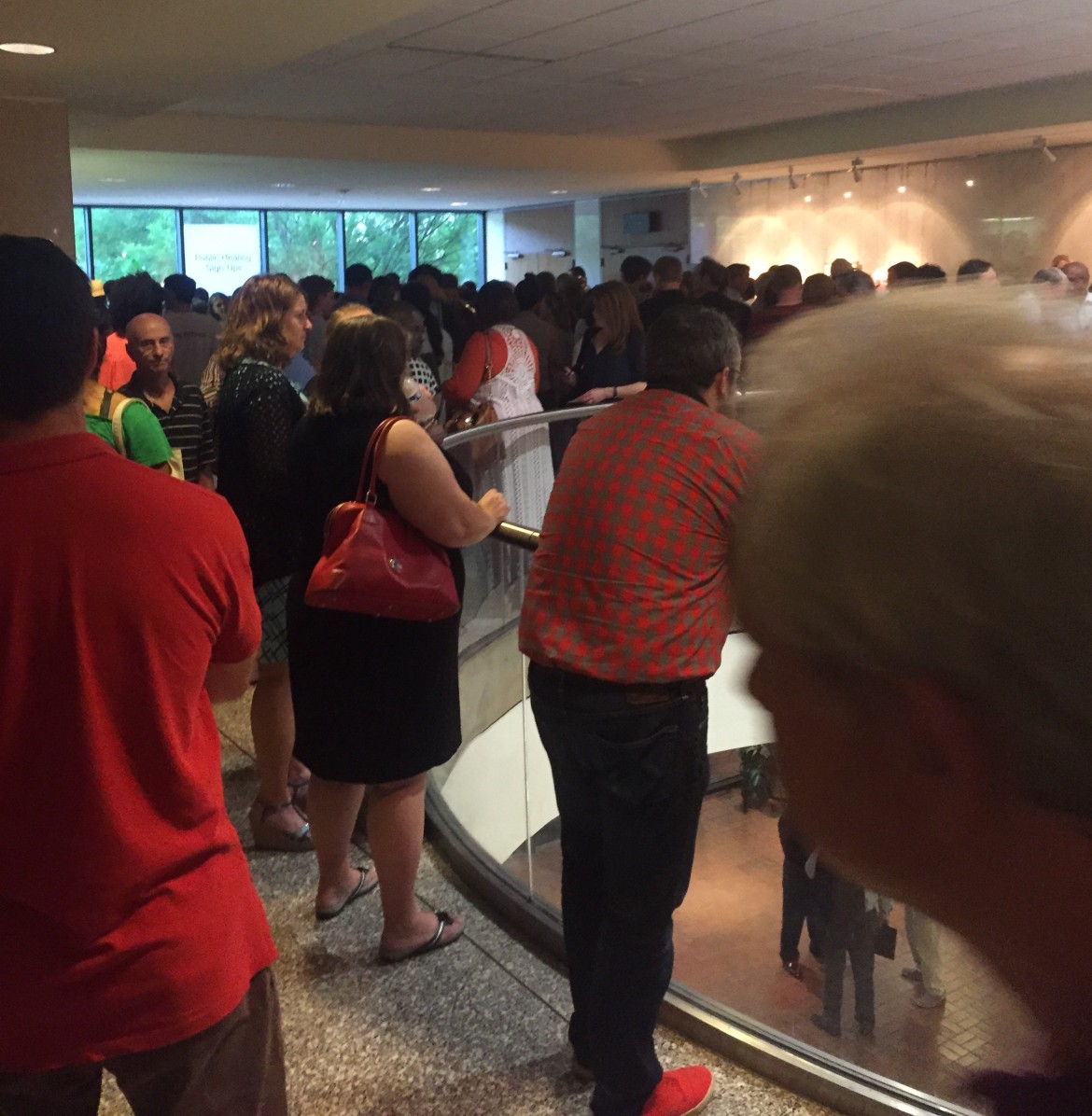Brought to you by Rufty-Peedin Design Build
Wednesday, March 16, 2016
Raleigh’s Planning Commission last met a week ago yesterday, where everything from a citywide remapping case to a text change relating to stormwater control exemptions was discussed over the course of a nearly two-hour meeting.
The first case was actually an update on one of our bigger stories from last year, Z-27-14, which sought to remap a significant portion of the city as specified under the Unified Development Ordinance.
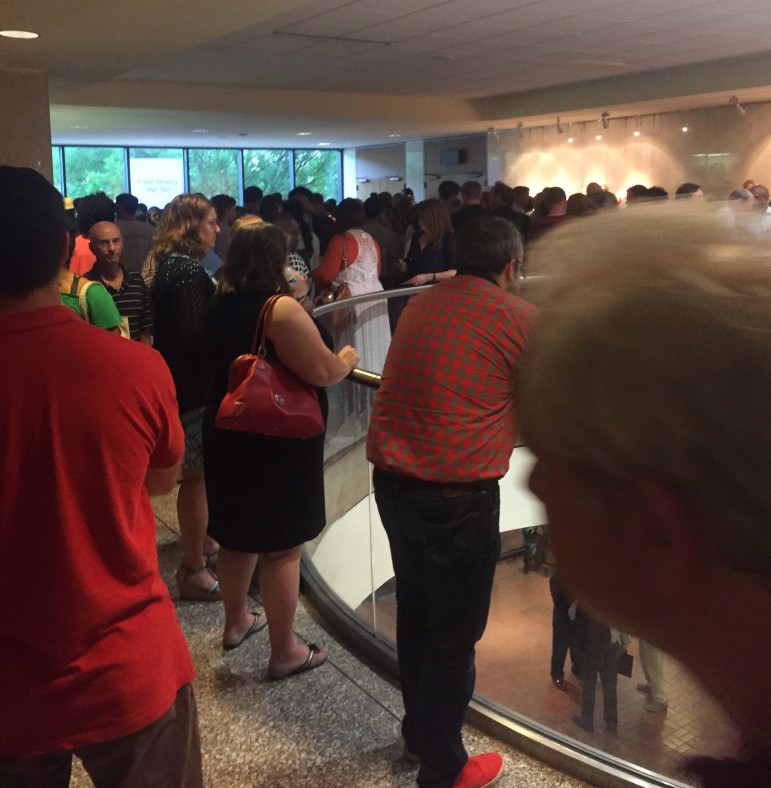
James Borden / Raleigh Public Record
Hundreds of residents turned out to a public hearing last summer for Z-27-14
Although community meetings had been held long before the explosive public hearing last July, significant public backlash on the case saw it sent back to City staff for further revisions.
Those revisions have now been completed, and for anyone interested in the specific details of those revisions, you can scroll down through the agenda from that meeting to find the report.
Commissioner Eric Braun summarized the report thusly: “This is the citywide remapping that we discussed for several meetings,”
“Unless there’s any questions, we’ve been over this for months and months, I don’t know if there’s anything to discuss.”
None of the Commissioners or any members of City staff had any comments, so Commission Chairman Steven Schuster opened it up to the public.
“Since we’ve had a series of public meetings on this over the last several months, it’s my sense that all the property owners and applicants who had issues they wanted to discuss have had that opportunity,” he began.
“But not wanting to deny anyone an opportunity, is there anyone here who has property or a case who would like to come up and make final comments before the commission takes action?”
Schuster’s offer, as with one he made at the meeting’s opening for members of the public to address any general concerns they had to the Commission, was met with silence.
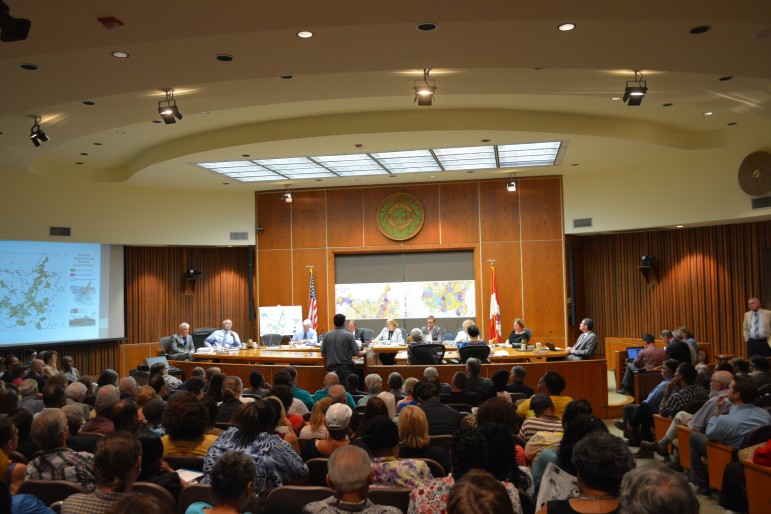
James Borden / Raleigh Public Record
Council Chambers were packed to full capacity for the public hearing on this case last July
Before a final vote was taken, Commissioner Braun requested clarification on some of the application’s language. Once that was settled, Commissioners voted unanimously to recommend readvertising (rather than recommending approval) the case. It was placed on the agenda for the March 15 City Council meeting.
New Business
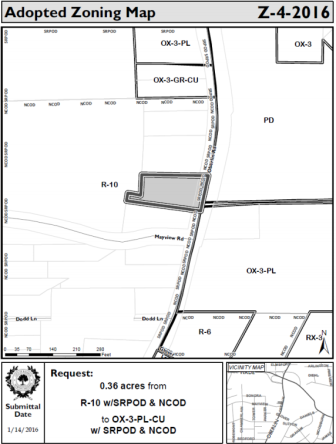 Only one new rezoning case was before the Planning Commission last week, Z-4-16. The case is seeking to rezone a .36 acre parcel of land on Oberlin Road near Wade Avenue and across from the Oberlin Court development to allow for office and residential development. It is currently only zoned for residential use.
Only one new rezoning case was before the Planning Commission last week, Z-4-16. The case is seeking to rezone a .36 acre parcel of land on Oberlin Road near Wade Avenue and across from the Oberlin Court development to allow for office and residential development. It is currently only zoned for residential use.
In the rezoning application, it is estimated that the development will increase traffic volume in the area by 627 trips per day. I’m sure the existing neighbors will be thrilled about that, although meeting minutes from a discussion between property owners and developers don’t mention traffic. Most of the concerns dealt with a desire to limit the number of stories and to keep it residential.
The applicant was not present to discuss the case, but had requested that it be deferred. Commissioners granted that request unanimously.
Text Ch-ch-ch-changes
 Two text change proposals were brought before the Commission last week, forcing them to turn and face the strange. The first, TC-2-16, dealt with exemptions from the stormwater control requirements. The text change would “amend those sites and uses that are exempted from the active stormwater control requirements of the code. This text change requires all new development or redevelopment to assess the impact of these developments on stormwater.”
Two text change proposals were brought before the Commission last week, forcing them to turn and face the strange. The first, TC-2-16, dealt with exemptions from the stormwater control requirements. The text change would “amend those sites and uses that are exempted from the active stormwater control requirements of the code. This text change requires all new development or redevelopment to assess the impact of these developments on stormwater.”
As both staff and the City Attorney’s office would like more time to review the change, Commissioners voted to send the case to the text change committee on the condition it would not be calendared until the change had been further reviewed.
The next case, TC-3-16, would change certain requirements for certificate of appropriateness reviews, including building paint colors, height and setbacks, the appeals process, and the process diagram.
Commission Chairman Schuster said he knew that the Historic Development Commission had been involved with this change, along with City staff and the City attorney’s office, and all were in favor of the change.
Commissioners voted unanimously to recommend approval of the change, and it was scheduled for the March 15 City Council meeting. Yes, I realize that was yesterday. We’ll have a write-up on that meeting next week.
Old Business
“Z-34-13 seems like an old friend,” Chairman Schuster began.
“The important number is 13: it means we’ve been seeing this for three years, and we made a commitment to council we move this forward today.”
The case would rezone a parcel on Hillsborough Street for higher residential density; Commissioner Schuster later summarized it by saying it would increase the number of units allowed from 44 to 66.
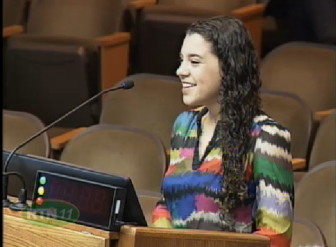
Nicole Toma
The most recent change to the case was the applicant agreeing to stormwater conditions for a 25-year, rather than a 5 or 10 year event scenario. Nicole Toma was there to speak on behalf of her father, who owns the property in question. She explained in further detail some of the conditions they had agreed to, and Commissioners thanked her for making the stormwater changes.
Several neighbors were on hand to speak against the project, mostly relating to the way information had been shared over the past several years. First up was Ahmed Baianonie,
“In our opinion, most of the meetings and communication with the property owners, I think, have been totally unprofessional,” he said.
“I think if you’re on our side you’ll see why; among other things, [the property owners] were totally unengaged in the whole process.”
Other neighbors expressed similar concerns, saying they had been misled, and that promises made by the owner about their plans for developing the space had turned out to be untrue.
City staff had not detected any major conflicts with the rezoning, and Commissioners voted to recommend approval on the condition that the neighbor’s concerns would be reported to Council.
Next up was case Z-46-15. This case would rezone a small (. 37 acre) parcel of land in Southeast Raleigh at the corner of South West and West Lenoir streets from R-20 to I-X. This would allow for a broader range of uses once the site developed. The applicant hasn’t announced specific plans for the site and in documents filed with the city, proposes the possibility of “light industrial, commercial, service/retail, and residential uses.”
After hearing from Ben Kuhn, who spoke on behalf of the applicant, and Will Marks, from the Central Citizens Advisory Council, which voted 12-3 in favor of the case, Commissioners voted unanimously to recommend approval.
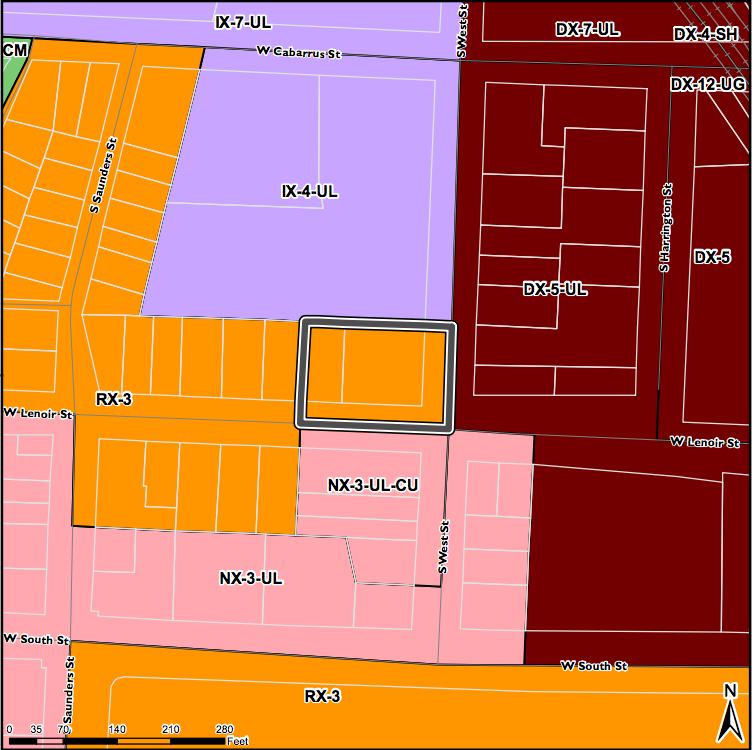
Z-46-15
